The conference is over and the real work is now beginning.Cathy Rhodes sent this report from Glasgow.
As soon as I heard that the United Nations Climate Change Conference was to be held in Glasgow, I knew I had to take this opportunity to be there in person: to listen, hear, march, learn and pray alongside so many other people. And, although the outcome of COP26 was disappointing to many, I am glad I made it there.
There was extensive reporting in the media before, during and after the event, with an overwhelming amount of information, jargon, facts and figures, emotion, passion and political negotiation. In all forms of the media there has been much to grasp and absorb before, during and after the conference. I hope this page will help you start to navigate the post COP26 world and discern what God is calling us to do, as Christians and church leaders, in this climate emergency on God’s created earth. Alongside reflections and images from my time at COP26, you will find information and a list of resources which I hope will be helpful.
What is COP26?
COP stands for ‘Conference of the Parties’ and the twenty-sixth of these was the one hosted by the UK in Glasgow from 1st – 14th November 2021. Many believed it was the world’s last best chance to get runaway climate change under control. At the COP21 in Paris in 2015, every country agreed to work together to limit global warming to well below 2 degrees and aim for 1.5 degrees. The ‘Paris Agreement’ means that, every five years, countries will set out plans on how much they would reduce their emissions as Nationally Determined Contributions, or ‘NDCs’.
What was achieved?
Jo Chamberlain, National Environment Officer for the Church of England, wrote a final summary, recording progress made alongside the severe disappointment and lament felt by many. Jo’s list of encouragements in the final text includes:
• Coal is mentioned for the first time in a COP agreement, and remained despite last
minute interventions to ‘phase down’ not ‘phase out’.
• There is a commitment to ending inefficient fossil fuel subsidies.
• The Santiago Network is being activated, a mechanism for funding for Loss and Damage, with a commitment made to holding a process of dialogue.
• There is an increased commitment to funding for Adaptation.
• The Paris ‘rule book’ has been agreed, meaning there is agreement about how to account for carbon emissions reductions, so that pledges can be assessed and countries held to account.
• Countries agreed to come back yearly with new pledges, rather than every five years, until pledges are enough to keep temperature rises to 1.5 degrees Celsius. But much more urgency is needed, especially progress on the following:
• The gap between change needed and agreements; the Carbon Action tracker calculates that the commitment keeps us to 2.4 degrees of global warming, a long way from the all-important 1.5 degrees.
• Keeping promises to the poorest and those least responsible for a changing climate. Terms of any new financing mechanisms for loss and damage are still being discussed, not yet agreed, and the pledge of $100bn annually for adaptation and mitigation has not yet been reached.
There has been disappointment that the COP was not as inclusive as it could have been: the voices of indigenous people and other marginalised groups were not fully heard. We cannot abandon the process, as the COP allows those most affected by climate change to directly confront the biggest emitters and speak of their experience. In the very last stages of the negotiations the whole deal was threatened by some countries pushing for weaker commitments, so others needed to compromise in order to ensure some form of agreement was reached. The Maldives issued this statement: ‘We are putting our homes on the line while other [nations] decide how quickly they want to act. The Maldives implores you to deliver the resources we need to address the crisis in small islands in time … This is a matter of survival.’
What has the Church of England said post COP26?
Graham Usher, the Church’s lead bishop for the environment, and Olivia Graham, Bishop of Reading, said: ‘At COP we called for keeping global warming to below 1.5 degrees, ending fossil fuel subsidies, and securing finance for the world's most vulnerable people who are already effected by climate breakdown … Negotiations always have some compromises and disappointments. These impact the world’s economically poorest the most…. The whole world needs to do more for climate justice. More quickly. More generously. More together. During its presidency year, the UK can be a key player. And this includes all of us within the Church of England. At Glasgow, the world glimpsed the possibility of a hopeful future. Hurting God’s creation and contributing to the suffering of God’s poorest people is not the ‘love God and your neighbour’ that Jesus commands of us. COP showed us the unity of purpose people of faith can bring. This encouragement should reignite in all of us hope for our future.’
There is more information about COP26 and the full statement at https://www.churchofengland.org
••••••••••••••••••••••••••••••••••••••••••••••••••••••••••••••••••••••••••••••••••••••••••••••
Some definitions
Adaptation: altering our behaviour, systems, ways of life, to protect our families, our economies, and the environment in which we live from the impacts of climate change. The more we reduce emissions right now, the easier it will be to adapt to the changes we can no longer avoid.
Mitigation: avoiding and reducing emissions of heat-trapping greenhouse gases into the atmosphere to prevent the planet from warming to more extreme temperatures. Affecting rising temperatures takes decades, so we must adapt now to the change already upon us which will continue to affect us in the foreseeable future. It means transitioning from powering our world with fossil fuels to using clean, renewable energy. And we need to reverse deforestation and restore our natural habitats until we reach net-zero carbon emissions.
Loss and damage: impacts of climate change such as loss of life, livelihoods, ecosystems or cultural heritage which exceed the adaptive capacity of countries, communities and ecosystems. These include severe weather events, desertification and rising sea levels. Poor and vulnerable countries who did little to cause the climate crisis are asking the rich nations responsible for the vast majority of fossil fuels for loss and damage funding.
Climate justice: the severe effects of global heating caused by industrialisation and emissions from wealthy countries are felt most by those who did least to cause them. Christians have been working alongside people of faith to speak of the need for Climate Justice, related fundamentally to Jesus’s commandment to love our neighbour. As Ruth Valerio says: our faith is rooted in the scriptures that tell us God is a God of Justice, who raises the poor from the dust and lifts the needy from the ash heap (Psalm 113). We are created in God’s image, which affirms that all people are equal. So what does it mean to be and to act in the image of God? In order to reflect God, we must demonstrate that active concern for people who are living in poverty.
••••••••••••••••••••••••••••••••••••••••••••••••••••••••••••••••••••••••••••••••••••••••••••••
What can we do?
Act justly
On Saturday 6 November, we took to the streets of Glasgow as part of the faith bloc to join the COP26 Day of Action. We collected Christian Aid placards from the Sandyford Henderson Memorial Church where we saw a large image entitled ‘Same Storm, Different Boats’ by artist Geoff Thompson.
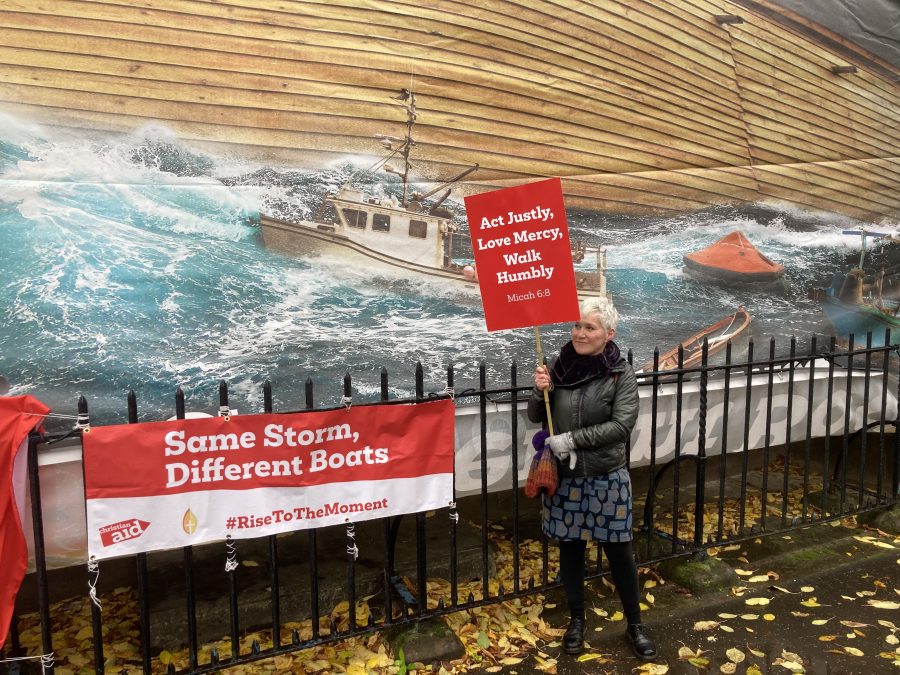 Cathy on the way to the March for Climate Justice.
Cathy on the way to the March for Climate Justice.
Unlike poorer nations, larger richer nations have the resources to cope with and mitigate the effects of the climate storm. We are not all in the same boat. My placard quoted a favourite verse from Micah 6:7: ‘Act Justly, Love Mercy, Walk Humbly’. As we marched, there was a repeated call and response: ‘What do we want? Climate Justice. When do we want it? Now’. It was wet and cold that day but the energy from those present was palpable. As the images show, people from many faith communities and organisations from the Quakers to CAFOD to Christian Aid and Tearfund joined in this call alongside thousands of marchers of all ages.
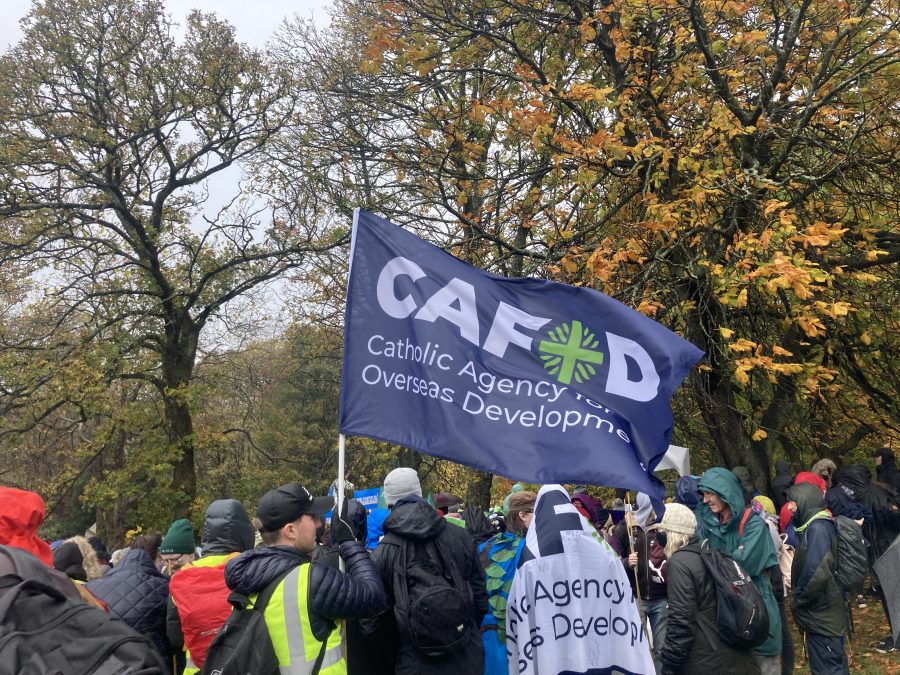
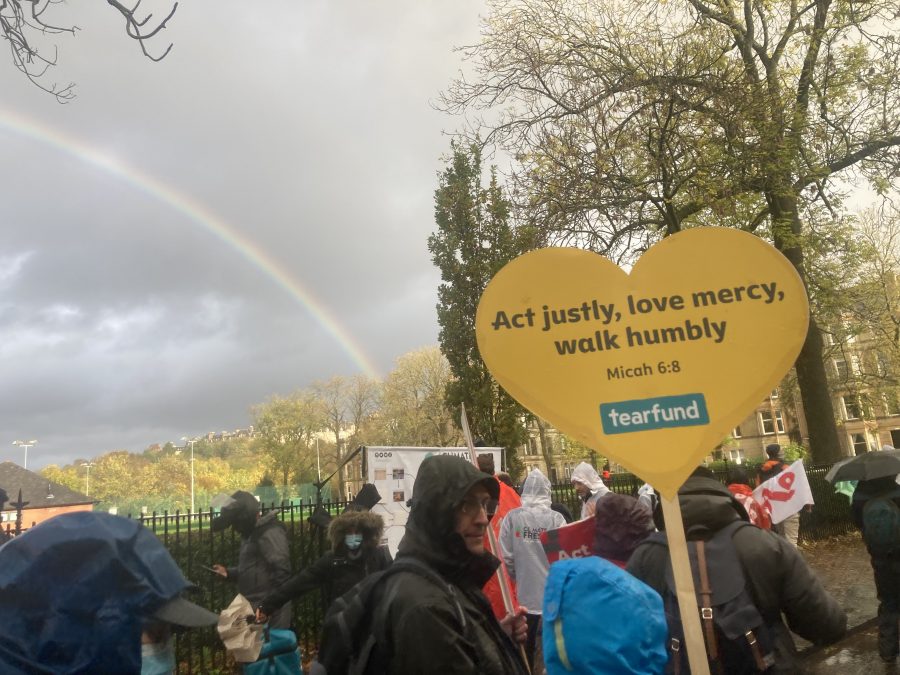 Different groups on the march
Different groups on the march
The Young Christian Climate Network (YCCN) organised a Relay from the G7 in June in Cornwall to Glasgow for COP26, and members and friends of YCCN marched with us, along with their boat, ‘The Pilgrim’. The YCCN website has helpful information especially for young people who want to get involved. Also have a look at the Tearfund/Youthscape ‘Burning down the House’ report online for sobering insight into how young Christians feel the church is not doing enough to speak up on environmental issues. The voices of the younger generations, who will survive to reap the consequences of our action and inaction, are loud and clear on this.
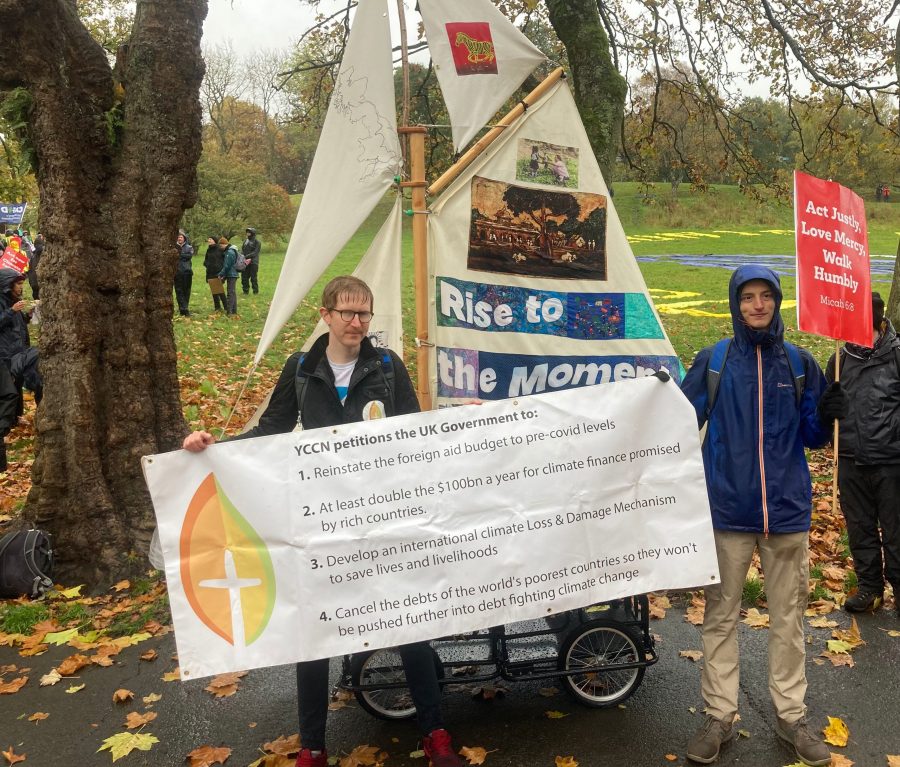 The YCCN pilgrims with their banner
The YCCN pilgrims with their banner
We also met with people from Islamic Relief UK, who called us over to stand with them and spoke of their belief in ‘treading lightly on the earth’. One of the main signs of hope from the whole of COP26 has been the unity and solidarity shown by faith groups calling for climate justice, and how this unity has given us a stronger voice. The government’s own faith groups toolkit recognises that ‘Representing over 80 per cent of the world’s population, faith, religion and belief groups have a unique perspective on climate change – in protecting the planet and supporting those on the front line of climate change – and a reach into communities around the world.’
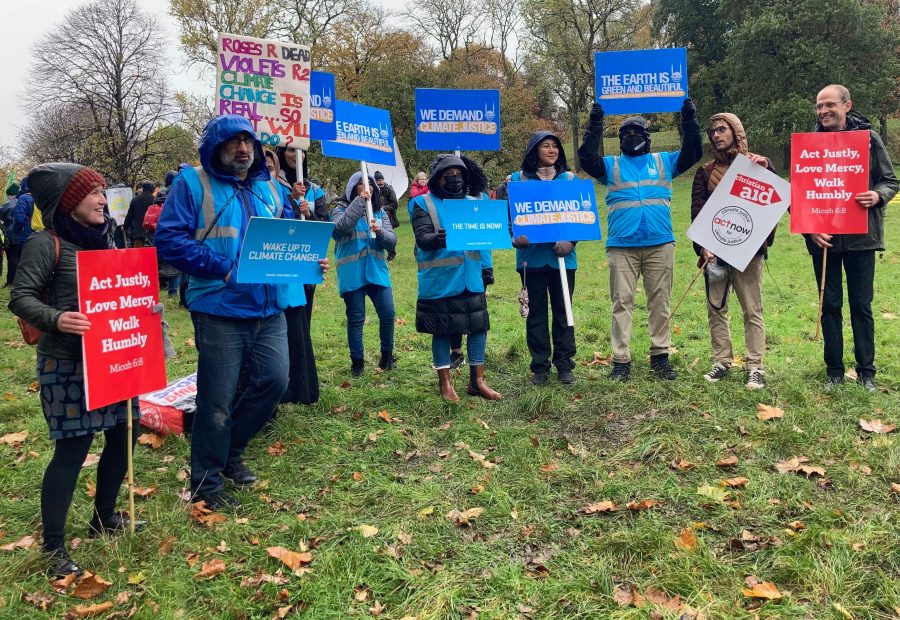 With marchers from Islamic Relief
With marchers from Islamic Relief
Rob Hopkins, founder of the Transition Movement, has helpful encouragement for us: ‘If we wait for governments to do it, it’ll be too late, and if we just act as individuals, it’ll be too little, but if we act as communities, it might just be enough.’
Eco Church
Becoming an Eco Church with A Rocha gives you a structure to work to in Worship and Teaching, Lifestyle, Land, Buildings and Community and Global Engagement. The last section encourages partnership working and lobbying our local politicians for change. It is really helpful to join this scheme for ideas small and large that churches and their congregations can take up. There are now 4000 Eco Churches in England and Wales! Search online for A Rocha Eco Church for information and resources, and to sign up to helpful mailings.
Learn
There are a number of resources and workshops around to help us as Christians understand the theology and thinking behind caring for God’s creation. Look at the websites below and seek out local and national courses too.
Pray
Christian Aid encouraged people to make prayer boats, some of which were sent to COP 26. I made a boat with the suggested prayer: ‘We pray for world leaders at COP26. Bless them with wisdom and a vision of hope. Give them determination to take strong action. Amen.’ If you have sharp eyes you can spot my little blue boat in the welcome sign at the top of this article, and in some of the other photos. It went everywhere with me when I was at COP26, including in my pocket on the march, and got rather soggy! But I have it now by my desk as a reminder of the prayers which rose up around the conference and the need to continue this. For Eco Church, praying for the environment and including it in worship is a vital part of the survey and there are many resources in the links below.
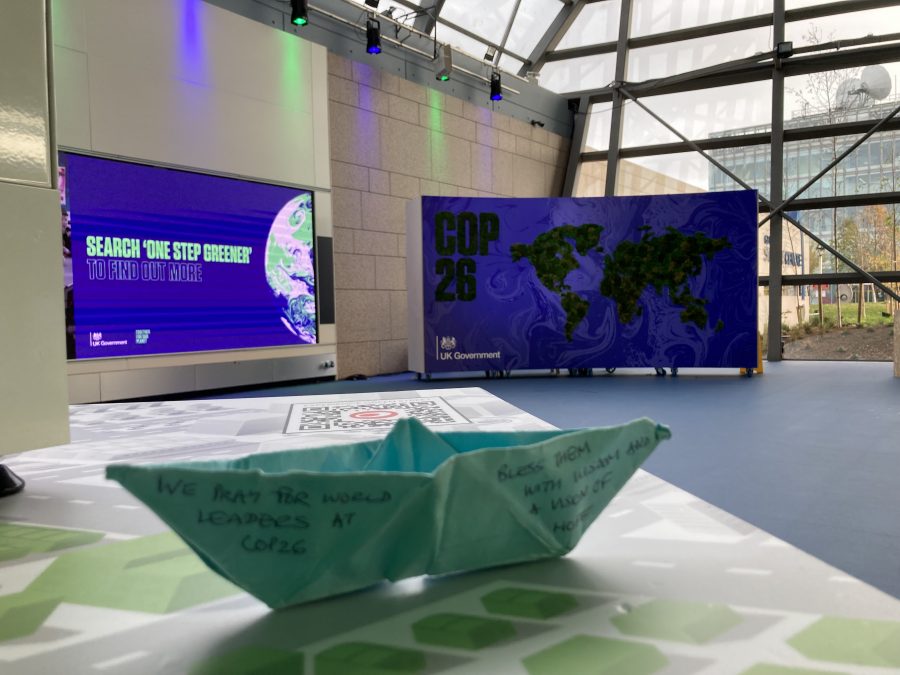
Cathy’s prayer boat has a rest
The future?
Jo’s final message gave me hope: ‘We can build on the legacy of COP, which has increased concern about climate justice in our churches and communities. We can continue to speak out and hold our leaders to account. And be encouraged in our own efforts to cut our carbon emissions, and look after creation, that these actions are all part of wider movement for change.’ During the march in Glasgow, a rainbow suddenly appeared in the sky. We all cheered as we witnessed this sign of the hope we hold in God, our creator.
••••••••••••••••••••••••••••••••••••••••••••••••••••••••••••••••••••••••••••••••••••••••••••••
To find out more
Go to greenchristian.co.uk and click on COP26 for theological reflections and a downloadable slide show on ‘Why faith matters at COP26’.
At seasonofcreation.org click on full guide for ‘A celebration guide’ with ecumenical worship and prayer resources which are helpful at Creationtide and beyond, including as part of your Eco Church ‘Worship and Teaching’ survey.
USPG produces annual five-week Bible study courses; For Such a Time focuses on ideas of ecological justice through reflections from across the Anglican Communion https://www.uspg.org.uk/engage/support5/forsuchatime/lent-course-2021/
Previous courses include ‘All Things Are Possible’ looking at the Sustainable Development Goals https://issuu.com/uspg/docs/_issuu__all_things_are_possible/2 and ‘A Heart for Mission’ about the Anglican Five Marks of Mission
https://issuu.com/uspg/docs/_issuu__a_heart_for_mission_1_
See also the reflection and advocacy guide Faith in a Changing Climate, offering stories for reflection and of action:
https://www.uspg.org.uk/engage/resources/faith-in-a- changing-climate/
Other useful sites are the Oxford Diocese Eco Hub, Church of England guidance and webinars and Green Anglicans. Search for Faith for the Climate to work together with other faith groups. Christian Aid and Tearfund have many resources on their websites. And WWF have an easy-to-use footprint tool.
••••••••••••••••••••••••••••••••••••••••••••••••••••••••••••••••••••••••••••••••••••••••••••••
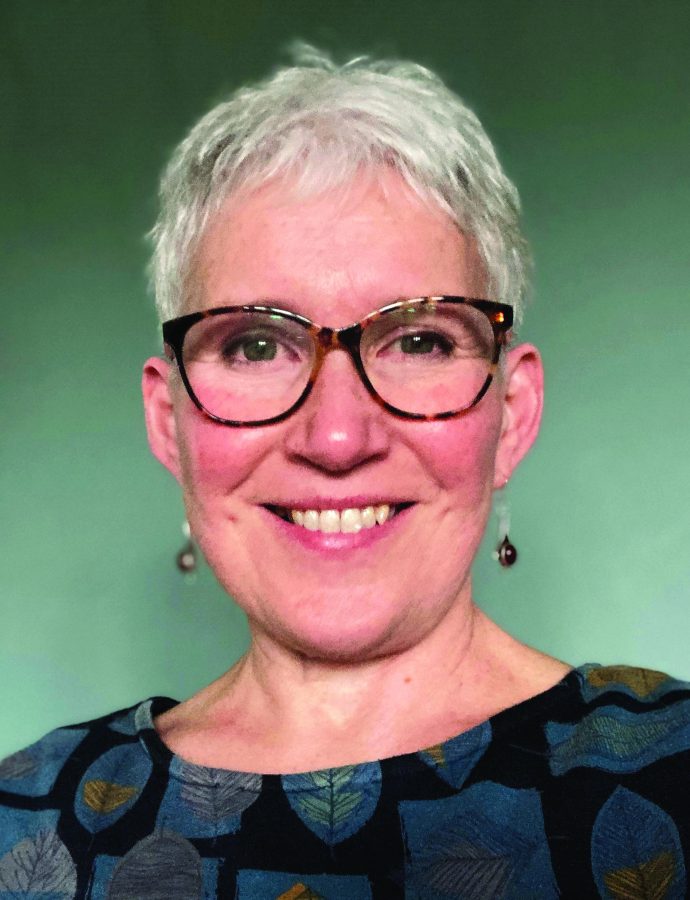
Dr Cathy Rhodes is Diocesan Environment Officer (DEO) for Sheffield Diocese. She would like to thank Jo Chamberlain, National Environment Officer for the Church of England, for her considerable input into this article.
A slightly shorter version of this article is published in the Spring 2022 issue of Transforming Ministry magazine.
